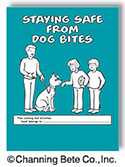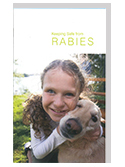

Control & Prevention in North Carolina
Rabies is a deadly viral disease that attacks the central nervous system of warm-blooded animals, particularly mammals. In North Carolina, the most common type of rabies is raccoon-variant rabies. It is found commonly in raccoons, skunks, red and grey foxes, coyotes, wolves, groundhogs and beavers. Bats can also transmit rabies but have their own bat variant rabies virus. Any mammal can become infected with rabies. The virus can infect domestic pets, agricultural animals such as cows and horses, and people when they are exposed to rabid wildlife.
North Carolina's rabies laws conform to recommendations of the Centers for Disease Control and Prevention and the National Association of Public Health Veterinarians' Compendium of Animal Rabies Prevention and Control ![]() .
North Carolina rabies law requires that all owned dogs, cats and ferrets must be vaccinated against rabies by four months of age (NCGS 130A-185
.
North Carolina rabies law requires that all owned dogs, cats and ferrets must be vaccinated against rabies by four months of age (NCGS 130A-185 ![]() ). One shot is not enough; rabies vaccinations must be kept current. Talk to your veterinarian about when your pet needs its rabies booster shots. To find a veterinarian, see the N.C. Veterinary Medical Association's website
). One shot is not enough; rabies vaccinations must be kept current. Talk to your veterinarian about when your pet needs its rabies booster shots. To find a veterinarian, see the N.C. Veterinary Medical Association's website ![]() .
.
If your pet is not currently vaccinated and is bitten by an animal that is or might be rabid, animal control is required by law to either quarantine the pet for six months or euthanize it (NCGS 130A-197 ![]() ). That choice must be made by the local health director.
). That choice must be made by the local health director.
In North Carolina and across the United States, the domestic animal that is most commonly infected with rabies is the cat. Cats that are kept outside unsupervised may prey on wildlife that are infected with rabies. The American Bird Conservancy's Cats Indoors! ![]() website has helpful tips for you and your cat.
website has helpful tips for you and your cat.
Enjoy wildlife, but at a distance. Never try to approach, handle, feed or rescue wild animals. To learn more about wildlife in North Carolina, see the N.C. Wildlife Resources Commission ![]() website. It is against the law in North Carolina to keep or try to rehabilitate wild animals that may carry rabies (called "rabies vectors"). Wild carnivores (meat-eating mammals) are likely to be infected with rabies (eastern raccoon variant) in virtually every county of N.C. (See Rabies Facts and Figures in N.C.). The N.C. Division of Public Health collaborates with United States Department of Agriculture's Animal and Plant Health Inspection Service's (APHIS) wildlife services (WS) program to help prevent the westward spread of rabies to other states through the Oral Rabies Vaccination program.
website. It is against the law in North Carolina to keep or try to rehabilitate wild animals that may carry rabies (called "rabies vectors"). Wild carnivores (meat-eating mammals) are likely to be infected with rabies (eastern raccoon variant) in virtually every county of N.C. (See Rabies Facts and Figures in N.C.). The N.C. Division of Public Health collaborates with United States Department of Agriculture's Animal and Plant Health Inspection Service's (APHIS) wildlife services (WS) program to help prevent the westward spread of rabies to other states through the Oral Rabies Vaccination program.
If you are bitten or scratched by any animal, clean the wound out well with soap and running water for 15 minutes and contact your doctor. Be certain to write down the location of the animal and a description of the animal to provide to animal control. Do not try to catch any wild animal that bites or scratches you. Call animal control immediately to capture the animal for rabies testing. If the animal is someone's pet, also get the owner's name and address and give them to the animal control officer. Any mammal can transmit rabies. The animal that bit you, depending on the species and circumstances, will have to be evaluated or tested for rabies. For dogs, cats, and ferrets, animal control may be able to locate the animal based on the information you provide, and place the animal in 10-day confinement as designated by the local health director (NCGS 130A-196).
To find an animal control agency near you, search the N.C. Animal Rabies Control Association (NCARCA) listings. ![]()
If you find a bat in your home, isolate it to one room, leave the room and close the doors. Call animal control to capture the bat for testing. Most human rabies cases in the United States are due to unrecognized exposures to bats (bat variant rabies). You may not recognize a bat bite or scratch, because the wounds they cause are so small. Most bats do not carry rabies in North Carolina; only about 3 percent of bats are infected. But because a diagnosis can't be made by looking at an animal, animals must be assumed to be infected with rabies until a laboratory-confirmed diagnosis is made. Learn more about bats from Bat Conservation International ![]() and at the Centers for Disease Control and Prevention's Bats and Rabies
and at the Centers for Disease Control and Prevention's Bats and Rabies ![]() website.
website.
In North Carolina, the State Laboratory of Public Health tests wildlife rabies vectors (animals that may carry rabies) that have bitten or otherwise exposed a person or a domestic animal that is not currently vaccinated. Dogs, cats and ferrets are also tested if they get sick with signs of rabies or die during a 10-day confinement after biting a person (NCGS 130A-199 ![]() ). Other animals may be submitted for testing with prior approval by the state public health veterinarians. Your county's animal control agency will have all the information needed to submit animals for rabies testing.
). Other animals may be submitted for testing with prior approval by the state public health veterinarians. Your county's animal control agency will have all the information needed to submit animals for rabies testing.
If you have any questions, feel free to call one of the N.C. DHHS Public Health Veterinarians at 919-733-3419; 24/7.
| Contact Veterinary Public Health for more information. | ||

|

|

|